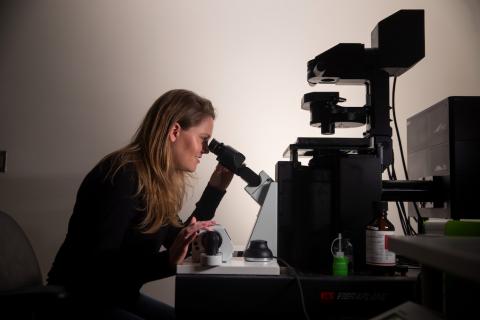Four students receive Carney's Graduate Awards in Brain Science

The Carney Institute for Brain Science has awarded four Graduate Awards in Brain Science for the 2019/2020 academic year. These awards recognize early career scientists who have made outstanding achievements as graduate students and have demonstrated strong potential for successful lifelong scientific careers.
Zachary DeLoughery
Zachary DeLoughery is a fifth-year Ph.D. student in Molecular Pharmacology and Physiology, who is working in the laboraroty of Professor Alexander Jaworski. For his project, DeLoughery will employ novel biochemical assays to elucidate how a unique mammalian guidance receptor, Robo3, is capable of transducing guidance information during spinal cord development.
DeLoughery's long-term goal is to direct his own research program which will advance the understanding of neural circuit development. He said he hopes to be a part of the global effort that will lead to the discovery of regenerative therapies for nervous system injury. DeLoughery is also passionate about educating, inspiring, and training the next generation of scientists; therefore, he hopes to give as many young minds as possible the tools to succeed in today’s competitive and complex scientific landscape.
DeLoughery received a B.A. from Assumption College in 2012 in Biology (neuroscience concentration), Biotechnology and Molecular Biology, and Chemistry. His award is supported by the Dr. Achilles Frangistas Fund for Neurodegeneration Research and the Mahoney Fund.
Kaitlyn Hajdarovic
Kaitlyn Hajdarovic is a fourth-year Ph.D. student in Neuroscience working in the laboratory of Professor Ashley Webb. Her research focuses on developing a novel cell reprogramming platform to study hypothalamic aging. The iPOMC platform that she is developing could lead to new insights into the mechanisms underlying hypothalamic aging. In addition, the system can be coupled with chemical and genetic manipulations (such as CRISPR/Cas9 screening) to reverse age-related changes an improve the function of degenerating neurons.
Hajdarovic's research goal is to uncover major molecular regulators of aging in the neurons of the hypothalamus. After graduation, she plans to apply the skills and techniques she developed as a student to a new problem that has affected her personally: chronic pain. She plans to seek a faculty position at a research university, where she will be able to pursue her research interests and train the next generation of scientists.
Hajdarovic received a B.S. in Neuroscience from Dickinson College in 2014, with minors in Biology and Creative Writing. Her award is supported by the Robin Chemers Neustein ’75 Graduate Fellowship Fund.
Lauren Olinski
Lauren Olinski is a fifth-year Ph.D. student in Molecular Biology, Cell Biology, & Biochemistry. Working in the laboratory of Professor Elena Oancea, Olinski is exploring the expression and signaling mechanisms of extraocular opsin OPN3 in the brain. Her project has the potential to provide therapeutic targets for neurological disease, and will broaden the understanding of nonvisual phototransduction which can be utilized for optogenetic advancement.
Olinski's long-term goal is to become an independent researcher in the field of neuroscience, and a leader in receptor signal transduction. She wants to perform research to uncover novel regulatory mechanisms leading to innovative therapeutic targets for disease.
Olinski graduated magna cum laude from the Rensselaer Polytechnic Institute in 2015 with a B.S. in Bioinformatics and Molecular Biology. Her award is supported by the Howard Reisman ’76 Family Graduate Fellowship Fund and the JBB Graduate Fellowship Fund.
Harrison Ritz
Harrison Ritz is a fourth-year Ph.D. student in Cognitive, Linguistic & Psychological Sciences. Working in the laboratory of Professor Amitai Shenhav, he will apply computational models of engineering control theory – such as those used in cruise controls and thermostats – to the cognitive and neural processes involved in goal-driven behavior.
Ritz's long-term goal is to work at an R1 university, heading a lab that develops rich processes models for neuro-cognitive control dynamics, and validates these models with advanced human neuroimaging techniques.
He received a B.Sc. in Psychology with honors and distinction from Queen’s University in 2014, and a M.S. in Psychology from University of Western Ontario in 2016. Ritz's award is supported by the Dr. Daniel C. Cooper Graduate Award and the Charles A. Dana Graduate Fellowship Fund.



